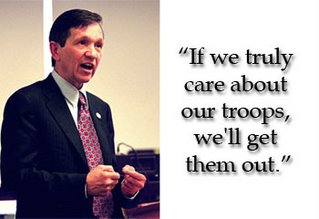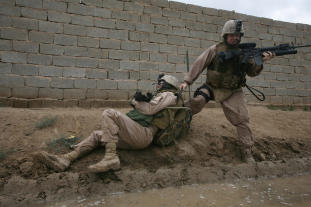Chuck Hagel Says "No" to Occupation
Today:
. . . . .The time for more U.S. troops in Iraq has passed. We do not have more troops to send and, even if we did, they would not bring a resolution to Iraq. Militaries are built to fight and win wars, not bind together failing nations. We are once again learning a very hard lesson in foreign affairs: America cannot impose a democracy on any nation -- regardless of our noble purpose.We have misunderstood, misread, misplanned and mismanaged our honorable intentions in Iraq with an arrogant self-delusion reminiscent of Vietnam. Honorable intentions are not policies and plans.
. . . . . It may take many years before there is a cohesive political center in Iraq. America's options on this point have always been limited. There will be a new center of gravity in the Middle East that will include Iraq. That process began over the past few days with the Syrians and Iraqis restoring diplomatic relations after 20 years of having no formal communication.
What does this tell us? It tells us that regional powers will fill regional vacuums, and they will move to work in their own self-interest -- without the United States. This is the most encouraging set of actions for the Middle East in years. The Middle East is more combustible today than ever before, and until we are able to lead a renewal of the Israeli-Palestinian peace process, mindless destruction and slaughter will continue in Lebanon, Israel and across the Middle East . . . .
The United States must begin planning for a phased troop withdrawal from Iraq. The cost of combat in Iraq in terms of American lives, dollars and world standing has been devastating. We've already spent more than $300 billion there to prosecute an almost four-year-old war and are still spending $8 billion per month. The United States has spent more than $500 billion on our wars in Iraq and Afghanistan. And our effort in Afghanistan continues to deteriorate, partly because we took our focus off the real terrorist threat, which was there, and not in Iraq.
We are destroying our force structure, which took 30 years to build. We've been funding this war dishonestly, mainly through supplemental appropriations, which minimizes responsible congressional oversight and allows the administration to duck tough questions in defending its policies. Congress has abdicated its oversight responsibility in the past four years.


